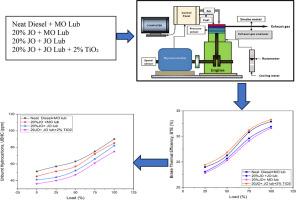Nanoparticle-enhanced bio-lubricants for cleaner and more efficient diesel engine performance
Q1 Chemical Engineering
引用次数: 0
Abstract
This study addresses the challenge of reducing engine emissions and improving performance by investigating the use of jojoba-derived biodiesel and bio-lubricants as sustainable substitutes for diesel and mineral oil. A comprehensive experimental evaluation was conducted on a single-cylinder, 4-stroke compression ignition engine. The baseline test utilized neat diesel with SAE 40 mineral oil, followed by tests using a 20 % blend of jojoba biodiesel. This blend was first tested with mineral oil, then with epoxidised jojoba oil as a bio-lubricant, and finally with a nano-enhanced bio-lubricant incorporating 2 % titanium dioxide (TiO₂) nanoparticles. Engine performance and emission characteristics were analyzed under varying load conditions to assess the viability of these alternatives. Parameters such as Brake Thermal Efficiency (BTE), Brake Specific Energy Consumption (BSEC), and Friction Power were evaluated. Emission outputs, including NOx, HC, CO2 and smoke opacity, were measured using standard instrumentation. The results indicate that the use of jojoba biodiesel blends improves BTE and reduces BSEC, highlighting enhanced fuel conversion efficiency. The replacement of mineral oil with epoxidized jojoba oil as a lubricant resulted in lower frictional losses and improved thermal stability. The addition of TiO₂ nanoparticles further decreased BSEC, confirming enhanced energy efficiency and smoother engine operation. Emission levels were significantly reduced across all biodiesel-biobased lubricant combinations compared to the baseline. Overall, the study underscores the viability of jojoba oil-based fuels and lubricants as renewable and eco-friendly energy sources. These findings support the advancement of sustainable energy technologies in internal combustion engines, aligning with global efforts to reduce fossil fuel dependency and environmental impact.

纳米颗粒增强的生物润滑油,更清洁,更高效的柴油发动机性能
本研究通过研究使用荷荷巴衍生的生物柴油和生物润滑油作为柴油和矿物油的可持续替代品,解决了减少发动机排放和提高性能的挑战。在一台单缸四冲程压缩点火发动机上进行了综合试验评价。基线测试使用含有SAE 40矿物油的纯柴油,随后使用20%混合荷荷巴生物柴油进行测试。该混合物首先使用矿物油进行测试,然后使用环氧化荷荷巴油作为生物润滑剂,最后使用含有2%二氧化钛(TiO₂)纳米颗粒的纳米增强生物润滑剂。在不同负载条件下,对发动机性能和排放特性进行了分析,以评估这些替代方案的可行性。对制动热效率(BTE)、制动比能耗(BSEC)和摩擦功率等参数进行了评估。排放输出,包括氮氧化物、HC、CO2和烟雾不透明度,使用标准仪器测量。结果表明,使用荷荷巴生物柴油混合物提高了BTE,降低了BSEC,突出提高了燃料转换效率。用环氧化霍霍巴油代替矿物油作为润滑剂,降低了摩擦损失,提高了热稳定性。tio2纳米颗粒的加入进一步降低了BSEC,证实了能源效率的提高和发动机运行的平稳。与基线相比,所有生物柴油-生物基润滑油组合的排放水平都显著降低。总的来说,这项研究强调了以荷荷巴油为基础的燃料和润滑油作为可再生和环保能源的可行性。这些发现支持了内燃机可持续能源技术的进步,与全球减少化石燃料依赖和环境影响的努力保持一致。
本文章由计算机程序翻译,如有差异,请以英文原文为准。
求助全文
约1分钟内获得全文
求助全文
来源期刊

International Journal of Thermofluids
Engineering-Mechanical Engineering
CiteScore
10.10
自引率
0.00%
发文量
111
审稿时长
66 days
 求助内容:
求助内容: 应助结果提醒方式:
应助结果提醒方式:


